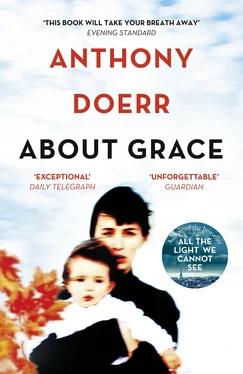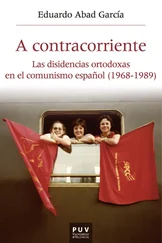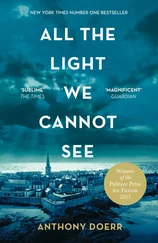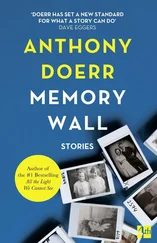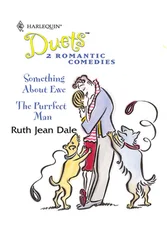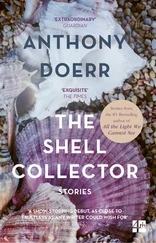Two months: rain on the windows, a pile of unopened meteorology texts on the table in his apartment that struck him for the first time in his life as trivial. He cooked noodles, wore one of the same two brown corduroy suits, checked the barometer three times a day and charted his readings halfheartedly on graph paper smuggled home from work.
Mostly he remembered her ankles, and the particles of dust drifting between them, illuminated in a slash of sunlight. The three freckles on her cheek formed an isosceles triangle. He had been so certain; he had dreamed her. But who knew where assurance and belief came from? Somewhere across town she was standing at a sink or walking into a closet, his name stowed somewhere in the pleated neurons of her brain, echoing up one dendrite in a billion: David, David.
The days slid by, one after another: warm, cold, rainy, sunny. He felt, all the time, as if he had lost something vital: his wallet, his keys, a fundamental memory he couldn’t quite summon. The horizon looked the same as ever: the same grimy oil trucks groaned through the streets; the tide exposed the same mudflats twice a day. In the endless gray Weather Service teletypes, he saw the same thing every time: desire.
Hadn’t there been a longing in her face, locked behind that bank-teller smile—a yearning in her, visible just for a second, as she dragged her eyes up? Hadn’t she seemed about to cry at the supermarket?
The Good Housekeeping lay open on his kitchen counter, bulging with riddles: Do you know the secret of looking younger? How much style for your money do cotton separates offer? How many blonde colors found in nature are in Naturally Blonde Hair Treatment?
He walked the streets; he watched the sky.
She called in September. A secretary patched her through. “He has a hockey game,” Sandy said, nearly whispering. “There’s a matinee at four-fifteen.”
Winkler swallowed. “Okay. Yes. Four-fifteen.”
She appeared in the lobby at four-thirty and hurried past him to the concessions counter where she bought a box of chocolate-covered raisins. Then, without looking at him, she entered the theater and sat in the dimness with the light from the screen flickering over her face. He took the seat beside her. She ate her raisins one after another, hardly stopping to breathe; she smelled, he thought, like mint, like chewing gum. All through the film he stole glances: her cheek, her elbow, stray hairs atop her head illuminated in the wavering light.
Afterward she watched the credits drift up the screen as if the film still played behind them, as if there would be more to the story. Her eyelids blinked rapidly. The house lights came up. She said, “You’re a weatherman.”
“Sort of. I’m a hydrologist.”
“The ocean?”
“Groundwater, mostly. And the atmosphere. My main interest lies in snow, in the formation and physics of snow crystals. But you can’t really get paid to study that. I type memos, recheck forecasts. I’m basically a secretary.”
“I like snow,” Sandy said. Moviegoers were filing for the exits and her attention flitted over them. He fumbled for something to say.
“You’re a bank teller?”
She did not look at him. “That day in the market…It was like I knew you were going to be there. When I dropped the magazine, I knew you’d come over. It felt like I had already done it, already lived through it once before.” She glanced at him quickly, just for a moment, then gathered her coat, smoothed out the front of her skirt, and peered over her shoulder to where an usher was already sweeping the aisle. “You think that’s crazy.”
“No,” he said.
Her upper lip trembled. She did not look at him. “I’ll call next Wednesday.” Then she was moving down the row of seats, her coat tight around her shoulders.
Why did she call him? Why did she come back to the theater, Wednesday after Wednesday? To slip the constraints of her life? Perhaps. But even then Winkler guessed it was because she had felt something that noon in the Snow Goose Market—had felt time settle over itself, imbricate and fix into place, the vertigo of future aligning with the present.
They saw Jaws , and Benji , talking around the edges. Each week Sandy bought a box of chocolate-covered raisins and ate them with the same zeal, the indigo light of the screen flaring in the lenses of her glasses.
“Sandy,” he’d whisper in the middle of a film, his heart climbing his throat. “How are you?”
“Is that the uncle?” she’d whisper back, eyes on the screen. “I thought he was dead.”
“How is work? What have you been up to?”
She’d shrug, chew a raisin. Her fingers were thin and pink: magnificent.
Afterward she’d stand, take a breath, and pull her coat around her. “I hate this part,” she said once, peeking toward the exits. “When the lights come on after a movie. It’s like waking up.” She smiled. “Now you have to go back to the living.”
He’d remain in his seat for a few minutes after she’d left, feeling the emptiness of the big theater around him, the drone of the film rewinding up in the projection room, the hollow thunk of an usher’s dustpan as he swept the aisles. Above Winkler the little bulbs screwed into the ceiling in the shape of the Big Dipper burned on and on.
She was born in Anchorage, two years before him. She wore lipstick that smelled like soap. She got cold easily. Her socks were always too thin for the weather. During the earthquake of ’64 a Cadillac pitched through the front window of the bank, and she had been, she confessed, thrilled by it, by everything: the sudden smell of petroleum, the enormous car-swallowing graben that had yawned open in the middle of Fourth Avenue. She whispered: “We didn’t have to go back to work for a week.”
The husband (goalie for his hockey team) was branch manager. They got married after her senior year at West High School. He had a fondness for garlic salt that, she said, “destroyed his breath,” so that she could hardly look at him after he ate it, could hardly stand to be in the same room.
For the past nine years they had lived in a beige ranch house with brown shingles and a yellow garage door. A pair of lopsided pumpkins lolled on the front porch like severed heads. Winkler knew this because he looked up the address in the phone book and began driving past in the evenings.
The husband didn’t like movies, was happy to dry the dishes, loved—more than anything, Sandy said—to play miniature golf. Even his name, Winkler thought, was cheerless: Herman. Herman Sheeler. Their phone number, although Winkler had never called it, was 542-7433. The last four digits spelled the first four letters of their last name, something Herman had, according to Sandy, announced at a Friday staff meeting as the most remarkable thing that had happened to him in a decade.
“In a decade, ” she said, staring off at the soaring credits.
Winkler—behind his big eyeglasses, his solitary existence—had never felt this way, never been in love, never flirted with or thought about a married woman. But he couldn’t let it go. It was not a conscious decision; he did not think: We were meant to be, or: Something has predetermined that our paths cross, or even: I choose to think of her several times a minute, her neck, her arms, her elbows. The shampoo smell of her hair. Her chest against the fabric of a thin sweater. His feet simply brought him by the bank every day, or the Newport pulled him past her house at night. He ate Apple Jacks. He threw away his tin of garlic salt.
Through the bank window he peered at the bankers behind their desks: one in a blue suit with a birthmark on his neck; another in a V-neck sweater with gray in his hair and a ring of keys clipped to his belt loop. Could the V-neck be him? Wasn’t he twice her age? The birthmarked man was looking up at Winkler and chewing his pen; Winkler ducked behind a pillar.
Читать дальше
